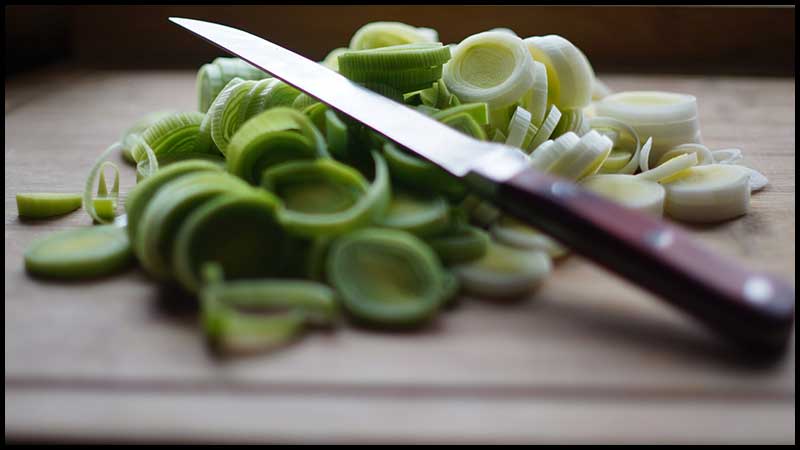Leeks are allium, a family of vegetables that includes hundreds of species including cultivated onion, garlic, scallion, shallot, and chives. The only edible part of this vegetable is its stalk which is just above the roots and stem base. They look like giant green onions and can stand in for onions in a number of dishes but are mostly used to enhance the flavor of broths. Results of many studies have shown that alliums may help lower the risk of heart diseases and stroke (1).
These better-known cousins of onion and garlic contain flavonoids that have a positive impact on blood pressure, vascular function, and cholesterol levels (2). These effects are also attributed to its kaempferol content which possesses anti-inflammatory properties. Kaempferol-rich foods are associated with a lower risk of heart attacks or death due to heart disease (3). In addition to this, flavonoids may also have anti-diabetic, and anticancer properties, as well as other health benefits (4).
Being a good source of sulfur compounds like allicin and other thiosulfinates, leeks may help reduce cholesterol, blood pressure, and the formation of blood clots. Furthermore, leeks are rich in antioxidants that fight oxidation that damages your cells and contributes to illnesses like diabetes, cancer, and heart disease (5).
Leeks also have high levels of folate, which promotes heart health and ensures homocysteine levels are in proper balance. Folate breaks down homocysteine into beneficial amino acids. Homocysteine, even in moderated amounts, can bring harm to the body.
What’s more? This vegetable is rich in potassium which is found to be helpful in lowering blood pressure levels. It works by improving the heart muscle contractility, thereby promoting the flow of blood, and therefore oxygen, through our bodies (7).
Other Health Benefits Of Leeks
- May boost immunity
- May help improve vision
- Reduce the risk of cataracts
- Helps in maintaining strong bones
- May play a role in weight management
- Relieves inflammation
These delicious, nutritious, and versatile addition to any diet can be eaten raw, but we can also poach, fry, roast, braise, boil, or pickle them. They make a great addition to stews, taco fillings, soups, dips, salads, quiches, stir-fries, and potato dishes.
Sources:
- https://www.ncbi.nlm.nih.gov/pmc/articles/PMC5986475/
- https://pubmed.ncbi.nlm.nih.gov/24091782/
- https://pubmed.ncbi.nlm.nih.gov/21428901/
- https://www.webmd.com/diet/health-benefits-leeks#1
- https://www.healthline.com/nutrition/leek-benefits#TOC_TITLE_HDR_4
- https://www.lightwaterhealthchiropractic.co.uk/blog2?aid=18039
- https://www.conserve-energy-future.com/benefits-of-leeks









